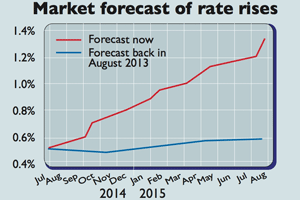Carney’s interest rate kerfuffle
Mark Carney's hints at a sooner-than-expected rate rise has caused a stir among investors.

Get the latest financial news, insights and expert analysis from our award-winning MoneyWeek team, to help you understand what really matters when it comes to your finances.
You are now subscribed
Your newsletter sign-up was successful
Want to add more newsletters?

Twice daily
MoneyWeek
Get the latest financial news, insights and expert analysis from our award-winning MoneyWeek team, to help you understand what really matters when it comes to your finances.

Four times a week
Look After My Bills
Sign up to our free money-saving newsletter, filled with the latest news and expert advice to help you find the best tips and deals for managing your bills. Start saving today!
Bank of England governor Mark Carney gave investors a jolt last week by saying that interest rates could rise "sooner than markets currently expect".
In response, interest-rate expectations soared, with the first rise from the current record low of 0.5% now pencilled in for late 2014, compared to the previous estimate of April 2015.
Trade-weighted sterling, measured against a basket of major trading partners' currencies, jumped to a new post-crisis high.
MoneyWeek
Subscribe to MoneyWeek today and get your first six magazine issues absolutely FREE

Sign up to Money Morning
Don't miss the latest investment and personal finances news, market analysis, plus money-saving tips with our free twice-daily newsletter
Don't miss the latest investment and personal finances news, market analysis, plus money-saving tips with our free twice-daily newsletter
"For all the headlines and histrionics," says Liam Halligan in The Sunday Telegraph, there was more to the speech than the half-sentence that caused the "frenzy of speculation". In fact,Carney's remarks were "heavily qualified".
He mentioned that the Bank's estimate of the spare capacity in the economy the extent to which growth can continue without sparking inflation is 1%-1.5% of GDP.
What's more, the bank thinks that the rate at which the economic "slack" in the system is being used up will slow in the second half of the year. All this would tend to point to a rate rise later rather than sooner.
In any case, says Halligan, investors should remember that Carney's previous attempts at guiding market expectations have hardly been an unqualified success. His forward-guidance policy was designed to provide reassurance about the path of interest rates, but just ended up causing confusion.

The upshot? We don't know when rates will rise; we merely know, given our huge debt load, that they are likely to impose "serious pain".
Carney's "forecasting abilities make Michael Fish look bang on", as Alistair Osborne puts it in The Times. But he's "in good company". Four months before the subprime disaster exploded, for instance, former US Federal Reserve chairman Ben Bernanke said subprime problems were likely to be contained. Given that, it's mystifying that markets still seem to hang on central bankers' every word.
Former Fed chairman Alan Greenspan admitted last year that "we really can't forecast all that well, and yet we pretend we can, but we really can't". That, as Osborne concludes, is the"truest thing he ever said".
Get the latest financial news, insights and expert analysis from our award-winning MoneyWeek team, to help you understand what really matters when it comes to your finances.

-
 How a ‘great view’ from your home can boost its value by 35%
How a ‘great view’ from your home can boost its value by 35%A house that comes with a picturesque backdrop could add tens of thousands of pounds to its asking price – but how does each region compare?
-
 What is a care fees annuity and how much does it cost?
What is a care fees annuity and how much does it cost?How we will be cared for in our later years – and how much we are willing to pay for it – are conversations best had as early as possible. One option to cover the cost is a care fees annuity. We look at the pros and cons.